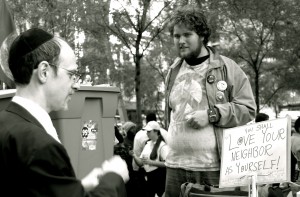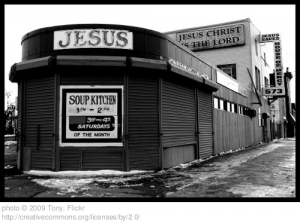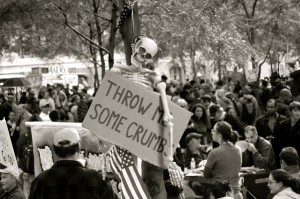Any society that will not care for its poor, in effect, prefers its rich.
It may give power and authority to those have much and sacrifice those who have less or little in the process. It may set a standard that only the wealthiest can attain and treat anything else as failure.
Happiness then becomes an increasingly shrinking target.
One can never have enough.
Justice becomes scarce.
Keeping up with the Joneses becomes keeping up with the bills.
Mercy vanishes.
All that is left is debt and frustration.
If you have been paying attention to the news over the last few weeks you may be wondering what's going on in our country and around the world. People are marching in the streets. People are camping in city parks. Even clergy are getting in the act. A friend of mine is serving communion on the sidewalks of Chicago to people who are now publicly questioning everything. During the Jewish Festival of Booths, synagogues and their leadership were building sukkot in public parks. And the New York chapter of the Council on American Islamic Relations held Friday prayers at Zuccotti Park in New York.
The movement has no single leader.
It’s simply a movement. … A recent poll by the Associated Press suggests that more than a third of the nation supports it. Even legends have taken to the streets.
Ninety-two-year-old Pete Seeger, smiling with a cane in his hand and a bright-red touk on his head, walked side-by-side with his 39-year-old grandson, Tao Rodriguez-Seeger, in an Occupy march down Broadway in New York City. In one photo of the marching Seegers, a protester held a sign behind them that read, “Lost my job and found an occupation.”
I’ve spent the last several weeks following the news. I read reports from Chicago and New York. I follow the blogs. I even read the sermons. Judson Memorial Church in New York City (a historic American Baptist congregation) has been deeply involved. You can go to their website and see how they’re participating.
Sometimes the people get fed up. We don’t always know who those people will be.
Whether tea partiers or the Wall Street occupiers — people are fed up.
They don’t believe justice is being done in this country any longer.
They have had enough. There seems to be this social tipping point in every society and we are there.
 The Bible reminds us that once Jesus was in the middle of yet another conversation with some local clergy and was asked a very challenging question: “What is the greatest commandment?” With several hundred to choose from, Jesus had a lot of options.
The Bible reminds us that once Jesus was in the middle of yet another conversation with some local clergy and was asked a very challenging question: “What is the greatest commandment?” With several hundred to choose from, Jesus had a lot of options.
Yet he offered this answer: “Love the Lord your God.”
It’s from Deuteronomy. Everyone present would have known it. Jesus was not the first religious thinker to offer it as an answer. The great Rabbi Hillel also had given that answer.
But Jesus then did something that may have been a little surprising. He brought Leviticus 19 into the picture. It begins,
“The Lord spoke to Moses, saying: ‘Speak to all the congregation of the people of Israel and say to them: You shall be holy, for I the Lord your God am holy.’”
In verse 9 it continues,
“When you reap the harvest of your land, you shall not reap to the very edges of your field, or gather the gleanings of your harvest. You shall not strip your vineyard bare, or gather the fallen grapes of your vineyard; you shall leave them for the poor and the alien: I am the Lord your God.”
[Read the rest of Lev. 19: 1-2, 9-18 HERE.]
There were these laws about how people were supposed to live with one another, about leaving enough for the poor and the strangers in the land to eat. It’s about living without fences around farmland.
Jesus took the spiritual commandment to love God with all our being and coupled it with this litany about economic justice by reminding people of Leviticus 19:18:
“You shall not take vengeance or bear a grudge against any of your people, but you shall love your neighbor as yourself: I am the LORD.”
Jesus, what is the greatest commandment?
“Love God.
“Completely.
“And love your neighbor as yourself.
“They are the same. The Love of God is to be reflected in all we do, in all our dealings with one another, in all the various facets of our lives together as a society.”
Jesus took what was generally understood to be a statement of spiritual purity and connected it to economic justice.
Not surprisingly he upset some people when he did that. We still don’t like to talk about God and money at the same time.
But there it is. A faith that does not bear fruit in the real world is a lifeless faith.
To love God means to live justly.
To love God means to live mercifully.
To love God with all of our being means to live compassionately in the world no matter what the popular economic system might be or what kind of government is in place.
The writer of Leviticus did not assume that everyone was on his or her own. No.
Instead the writer of this legal document assumed that there were people who would need some care. The poor would need food. And those who were strangers in the land would need food. This passage is all about how people live with their neighbors and what justice might look like.
In the middle of the passage is this one line that I think we also need to hold up today given everything that’s going on. Leviticus 19:15 reads: ”
You shall not render an unjust judgment; you shall not be partial to the poor or defer to the great: with justice you shall judge your neighbor.”
People are in the streets of New York City, Chicago, Oakland, and San Francisco because they believe that the government has been “deferring to the great.” When that happens everyone else will feel the pinch.
Jesus reminds us now — as he reminded people 2,000 years ago — and as his spiritual forebears knew, justice exists when everyone in society is treated equally and with sacrificial compassion.
Don’t squeeze every dime.
Don’t fence off your fields.
Fences actually make for bad neighbors. They cut us off from one another and leave some people to starve in the streets. And when the strangers pass through the land they will not experience hospitality but alienation.
Finally, there’s something else important to understand here. I think that for Jesus the issue wasn’t about the form of government or the economic theory at work.
 It’s popular right now in some Christian circles to try to guess at what economic or governmental model is most Christian. I think that’s missing the point.
It’s popular right now in some Christian circles to try to guess at what economic or governmental model is most Christian. I think that’s missing the point.
Jesus was trying to change the goals of the hearts, minds, and spirits of the people attempting to live with one another.
Big government or small, free market or heavily regulated … the call of the Gospel people does not change. The Commandment of God does not change just because we elect someone new into office.
Love God. Love your neighbor. The love of God and economic justice go hand-in-hand. And it takes all of us to make it work.
The Occupy Wall Street protesters have a slogan that has become well-known, “We are the 99 percent!” It refers to the difference in wealth between the top 1 percent of income earners in this country and the other 99 percent.
“We are the 99 percent!” is a cry for justice … and it may very well be needed.
But I think Jesus would expand that and say, “We are the 100 percent!”
We’re in this thing together or we’re not in this thing at all.
We should all be marching in the streets.
We are the 100 percent.
We are poor. We are well-to-do. We are those somewhere in the middle. We are aware of the struggles and unfairness of this world and for this reason we are sensitive to one another’s needs. So, we love our neighbors as ourselves.
We are the 100 percent.
We know that the market will always prefer one thing over and against another. One career path will always make more than others. If it’s not doctors and lawyers, it will be software engineers and mortgage brokers, or whatever the future may bring. And because we are not naive, we love our neighbors as ourselves.
We are the 100 percent.
We are the people wise enough to know that scapegoating anyone has never once fixed a system. It merely shifts the scales of injustice in another direction. And when that system collapses, which it will, we’ll find someone else to blame. And so, we love our neighbors as ourselves.
We are the 100 percent.
We are the Beloved of God. We are the people who love God so much that we cannot help but to love all our neighbors and embody God’s grace, that grace which is meant for all people.
We love God. So we live justly. We live mercifully.
When you love God, no one is to be left out. When you love God, justice and mercy belong to all. When you love God, you recognize that scapegoating one another solves nothing.
Love God.
Love your neighbor.
We are the 100 percent.
Thanks be to God.
 Tripp Hudgins is a doctoral student in liturgical studies at the Graduate Theological Union in Berkeley, Calif., and associate pastor of First Baptist Church of Palo Alto, Calif. You can read more of his writings on his longtime blog, “Conjectural Navel Gazing; Jesus in Lint Form” at AngloBaptist.org.
Tripp Hudgins is a doctoral student in liturgical studies at the Graduate Theological Union in Berkeley, Calif., and associate pastor of First Baptist Church of Palo Alto, Calif. You can read more of his writings on his longtime blog, “Conjectural Navel Gazing; Jesus in Lint Form” at AngloBaptist.org.
Got something to say about what you're reading? We value your feedback!
